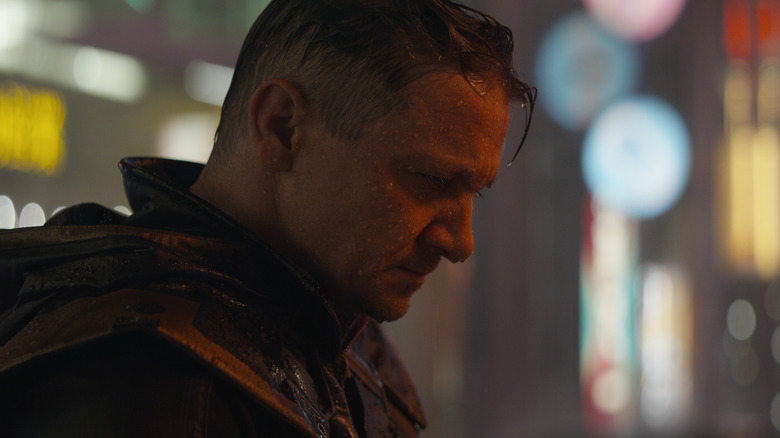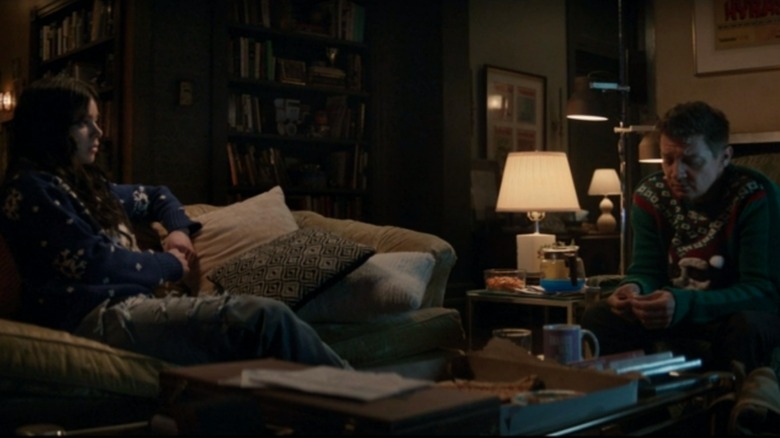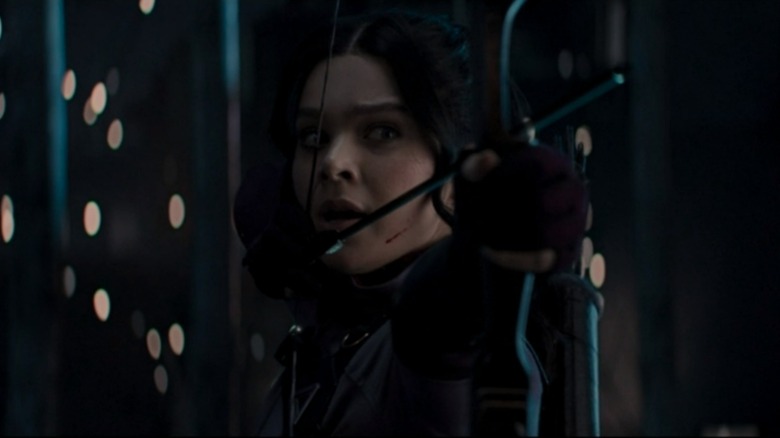How Hawkeye Finally Addresses The Darker Side Of Being A Superhero
"People don't want that cynical 'cool' thing anymore, they want sincerity. Not self-seriousness, but heart-on-your-sleeve sincerity."
About midway through the second episode of "Hawkeye," titled "Hide and Seek," Kate Bishop (Hailee Steinfeld) and Clint Barton (Jeremy Renner) are strolling through the streets of New York City and end up holding an impromptu debate that feels much bigger than a mere difference in opinion. On a surface level, the scene is ostensibly about Kate calling out Hawkeye's (perceived) branding flaws as a hero/celebrity figure in the world of the Marvel Cinematic Universe, where he chooses to remain in the shadows rather than embrace his potential to inspire others. On a broader level, of course, Kate's argument about sincerity over brooding might as well be a fourth wall-breaking mission statement on Marvel's behalf. In a superhero landscape overrun by attempts to address the edgy idea of how these all-powerful beings actually cause far more harm than good, the MCU continues to stand apart from its peers for focusing much more on the uncomplicated positivity that superheroes bring to the table.
But is that for the better, or for worse? The MCU hasn't always shied away from the inherent darkness of what superheroics necessarily entail — even Hawkeye admits as much to hero-worshiping Kate, showing his vulnerable side during a low moment in last night's episode "Partners, Am I Right?"
"In the end, my job has always been to hurt people."
Now, obviously nobody's expecting that to end up being the main message of this show, but it's hard to ignore the truth behind the brutal frankness of those words ... or, for that matter the MCU's overall failure to engage with that idea on any meaningful level in the past. That changes dramatically with episode 4 of "Hawkeye," however, as the idea of loss hangs heavy over the proceedings of this latest episode. And if you ask me, this sort of reckoning has been long overdue.
General spoilers for the first four episodes of "Hawkeye" follow.
Alone for the Holidays
Though the first two episodes of "Hawkeye" got off to somewhat of a shaky start, the series has settled into a rhythm thanks to the dynamic between Clint's jaded and world-weary archer, and Kate's refreshingly clear-sighted and aspirational mindset. Marvel isn't exactly breaking the mold with this particular character dynamic, but just think of it like the world's general perception of the power-less and non-flashy Hawkeye himself: functional and gets the job done! Episode 4, directed by series creator Rhys Thomas and written by Elisa Climent, takes those two very different worldviews and mines even more effective drama out of Kate and Clint's extenuating circumstances. Though suspicion continues to swirl around Tony Dalton's Jack Duquesne and his engagement to Kate's mother, Eleanor (Vera Farmiga), at least none of them are alone for the holidays. Kate's makeshift family juxtaposes harshly with Clint, who has left his family behind yet again to do his duty and is at risk of breaking his promise to be home in time for Christmas.
Visited by Kate in a very touching gesture of support, Clint finally opens up about his rage-filled past as Ronin in the aftermath of the Mad Titan Thanos snapping away entire family (apologies, dear reader, but Marvel's accepted terminology is just too goofy-sounding for me to ever unironically refer to it as "The Blip"). Though the concept and actual execution of Clint channeling his anger and grief by murdering a bunch of random criminals in "Avengers: Endgame" always struck me as incredibly silly, the willingness to at least "go there" is more than most other MCU productions can say. Here, "Hawkeye" makes good on this canonical history and even makes it better in retrospect by taking the time to address Clint's guilt and the larger repercussions of his actions — particularly where Maya Lopez/Echo is concerned.
Tellingly, this all comes out during the kind of (relatively) lengthy conversational scene that Marvel movies rarely seem to have time for these days. Importantly, Clint takes accountability for his own actions despite Kate's attempts to relegate his mistakes to the past: "That's why I'm here. And I can't go home until I fix it." Though "Hawkeye" has provided plenty of lighthearted moments so far, no ill-placed humor undercuts the emotions of the scene, which ends with PTSD flashbacks to Ronin and, notably, Natasha Romanoff's death.
The Shot Not Taken
When it comes to death, superhero media comes with a built-in weakness: the dead can always come back, thus sparing survivors the pesky legwork of needing to come to terms with it. Though it's once again baffling that Marvel chose to kill off Gamora in the most undignified manner possible, only to have Natasha Romanoff (Scarlett Johansson) double down through a bizarre die-off competition with Clint to see who could jump off that very same cliff first, episode 4 of "Hawkeye" once again makes lemonade out of the lemons it inherited from the prior events of the MCU saga.
Longtime Marvel fans are well aware of how Clint and Natasha first crossed paths, when Natasha transformed from a target to be killed to a soul worth saving. 2012's "The Avengers" touches upon this crucial character history, which was further fleshed out earlier this year in "Black Widow." Fittingly, "Hawkeye" once again revisits this to make a poignant statement about death, killing, and the nature of heroism. This time, however, we see this through the bright-eyed lens of a would-be superhero, still figuring out how she wants to take up the mantle.
During Kate and Clint's same quiet conversation in the apartment, their bonding over a shared love for archery is interrupted by the sobering realization of how much responsibility comes with the weapons in their hands. Asked for the best shot he ever took, Clint quickly responds that it was, "The one I didn't take." Part of the problem with the Ronin persona is how this hardly feels much different from Hawkeye's usual tactics — it was only in the very last episode, after all, that Hawkeye went right back to shooting fatal arrows at (and, uh, through) various Tracksuit Mafia henchmen without a second thought. But at the very least, "Hawkeye" reestablishes the conflicted hero's moral compass through his darkest moments and provides a better way forward for Kate, who faces the exact same moment of choice upon the unexpected appearance of Florence Pugh's Yelena Belova.
This proves to be the key to this latest episode and possibly even the series overall. By emphasizing Clint Barton's failings, Marvel is tacitly admitting that this next generation of heroes must be better than the previous one. For one moment, at least, "Hawkeye" focusing on the dark side of superheroes makes the light shine through all the brighter.


